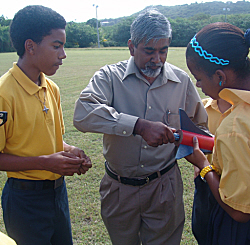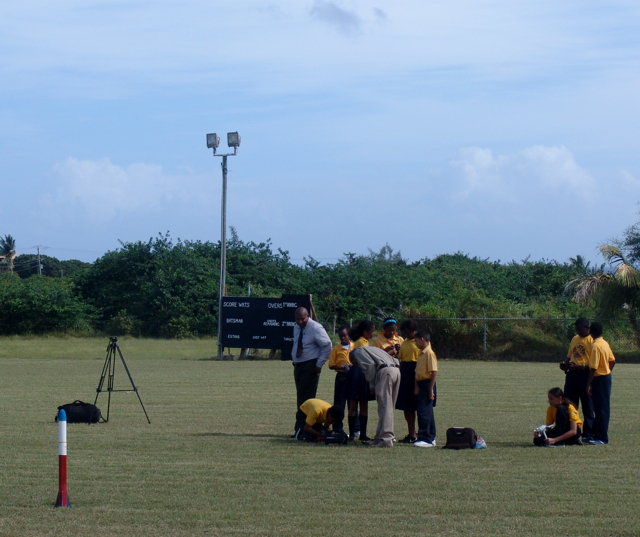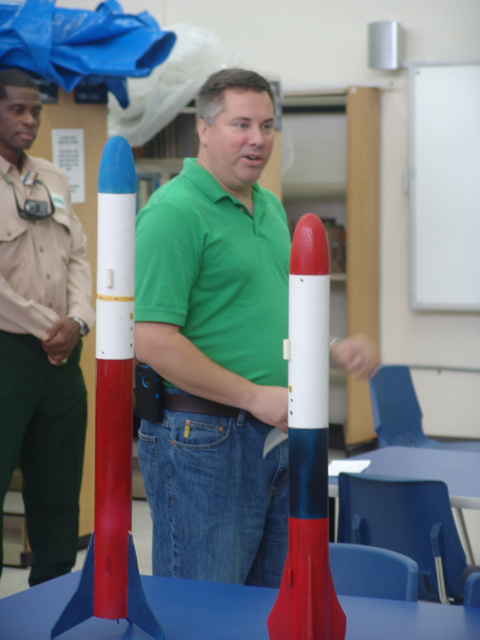
The 18 students are members of the school’s model rocketry club, and Friday they were on hand to watch as the refinery continued its support of science in the schools by making a $3,500 donation to the club.
Math and science are the fundamentals of rocketry, said David J. Roznowski, head of corporate communications for the St. Croix refinery. They are also the same skills the refinery looks for when it hires engineers, and any number of successful careers are built on them these days.
The rocketry club was founded by ECJHS science teacher Stephen Bullock in 2007 with help from Hovensa, which supplied a weather station for the club. Knowing the weather is an important part of rocketry, Bullock explained. If the wind exceeds 20 miles an hour, the launch has to be scrubbed. And too-high humidity can cause problems for the solid-propellant rocket motors, he added.
But recently the weather equipment began acting up, and Bullock contacted the company to see if they could help out. Roznowski said a couple of the company’s technicians went out to look at it, but it couldn’t be fixed and the parts were no longer available.
"So we’re buying them a new one," he told the club members gathered in the Elena Christian library.
The new weather station will cost about $1,500. The company also donated $2,000 in cash to help the club prepare for the Team America Rocket Challenge, the finals of which are held every year in Virginia.
Elena Christian Junior High is one of almost 700 schools across the United States and territories that compete, and in 2010 became the first school from outside the continental U.S. to qualify for the finals. That year they finished out of the running because of an equipment failure, but Bullock said he was told if that hadn’t happened, there was a good chance they’d have finished at least 25th.
The top 10 finishers share $60,000 in prize money, with the winner taking home $20,000.
Juancito Gario, a St. Croix native who is now an instrument technician at the refinery, called the science and math they’re learning now "the building blocks" for their future.
"I’ve been through the same way, I studied the same building blocks," he said. "Whatever you dream, you will achieve it if you keep doing what you’re doing. Don’t let anyone tell you you can’t do it."
After the presentation and pep talk, the club led about a hundred other students on a half mile walk to a nearby park, where they prepared to launch a rocket to demonstrate what they’re doing. When they try to qualify for the finals and in Virginia, if they make it that far, the kids will have to do all the work. Friday Bullock helped them through their paces.
In competition they have to shoot a rocket to 800 feet, with the time from launch to landing 45 seconds, and the rocket – a cardboard, plastic and balsa wood launch vehicle almost three feet tall – has to carry and return two raw eggs without breaking them.
Teams lose points the more they vary from those standards, Bullock explained. The first attempt to qualify for the finals in Virginia will take place n February, he said, with the final chance in April. The finals are held in May.
Friday’s demonstration showed why teams practice. The students drove a metal rod into the ground that would serve as the launch pad. Then they attached wires to the battery and ran the wire out to the rocket. A motor was installed in the rocket, the igniter placed in the motor and wired to the cable. Then everyone backed off.
The countdown was loud – "Five! Four! Three! Two! One!"
And nothing happened.
The students checked their work, all the way back to the rocket. Then another countdown and another failure to launch.
Bullock and his students rechecked every connection, checked their battery pack. Checked the rocket. Then everyone scurried back to safety. Again the countdown.
Again nothing. For a moment. Then just as everyone relaxed and the students again bent over their battery pack, there was a hiss and a "whoosh!" and a small cloud of smoke. Heads craned skyward and picked out the dot the rocket had become. Then the nose burst open, the parachute deployed and it began its descent to earth. (This, by the way, explains why none of the media gathered got a picture of the actual launch.)

The students hurried off to retrieve the rocket. Bullock said the altimeter that records its height will emit a beep for at least 24 hours to help them find it.
He opined that launch delays had probably been caused by corrosion in the wires that caused a short. Moving the wire may have bridged the short and allowed the launch. The team will have to inspect everything before attempting to qualify.
In a statement released by Hovensa, the company’s president and CEO, Bran Lever said, “The rocket program is using practical math and science skills that are also essential to the operations of our refinery. Our support of this program meets our community goals of inspiring and cultivating students in the Virgin Islands to pursue degrees in math, science, chemistry and engineering.”
Though the club is only five years old, Bullock said it is already becoming rooted and spreading on the island. Students who have moved on from Elena Christian to St. Croix Educational Complex wanted to continue the hobby and pushed for creation of a club. Complex Principal Willard John contacted Bullock, who recently brought five of his club members to the high school to help them build their own first rocket, he said.






